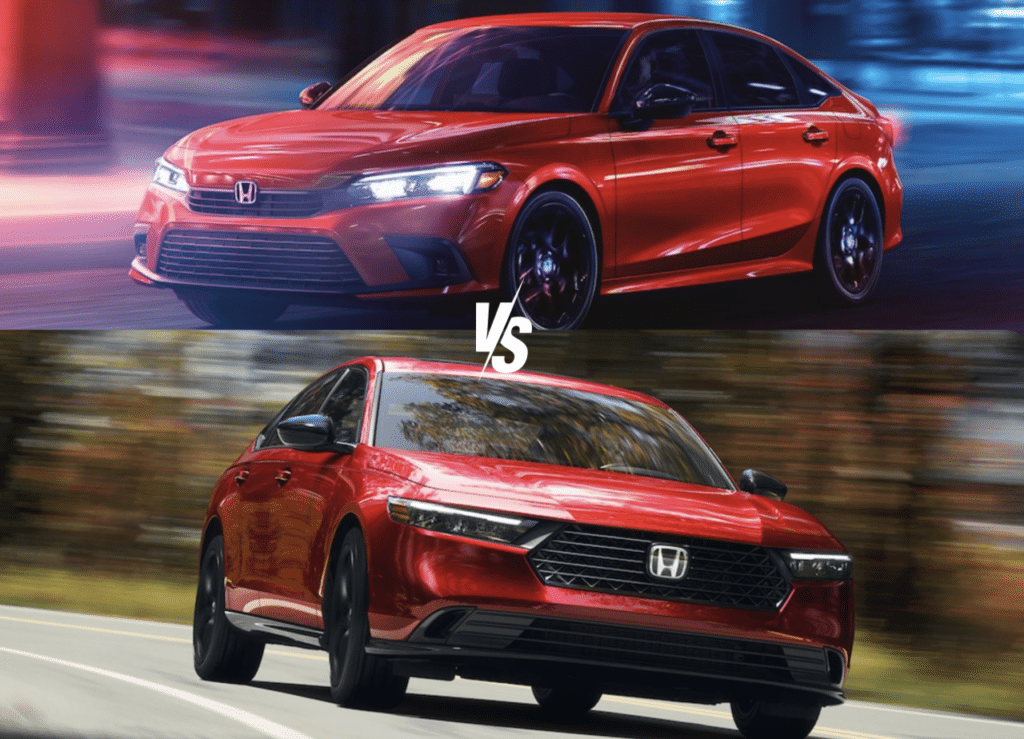Are you torn between the Honda Civic and the Accord?
Both offer reliability and style, but which truly saves you money at the pump?
With gas prices constantly fluctuating, choosing a fuel-efficient car is more important than ever.
Imagine never having to worry about your budget when filling up your tank.
In this article, we’ll compare the fuel efficiency of the Honda Civic and Accord, helping you make an informed decision that keeps your wallet happy and your drives enjoyable.
Get ready to discover which Honda model reigns supreme in the battle for fuel efficiency supremacy!
Honda Civic and Honda Accord: Overview
The Honda Civic and Accord are two of the most popular cars in their respective segments.
The Civic, a compact car, offers a perfect blend of affordability, reliability, and efficiency.
Its sleek design and modern features make it an attractive choice for many drivers.
On the other hand, the Accord, a midsize car, provides more space and comfort while still maintaining impressive fuel efficiency.
Both models have recently undergone updates that enhance their performance and fuel economy.
Engine Options and Their Impact on Fuel Efficiency
For Honda Civic
The Honda Civic comes with two engine options:
- A standard 2.0-liter four-cylinder engine producing 158 horsepower and 138 lb-ft of torque
- A more powerful 1.5-liter turbocharged four-cylinder engine that delivers 180 horsepower and 177 lb-ft of torque
The Honda Civic’s 2.0-liter engine achieves an EPA-estimated 30 MPG in the city, 37 MPG on the highway, and 33 MPG combined.
The 1.5-liter turbocharged engine offers even better fuel economy, with an EPA-estimated 32 MPG in the city, 42 MPG on the highway, and 36 MPG combined.
Both engines are paired with a continuously variable transmission (CVT) for smooth and efficient power delivery.
For Honda Accord
The Honda Accord offers a similar lineup:
- A standard 1.5-liter turbocharged four-cylinder engine producing 192 horsepower and 192 lb-ft of torque
- A hybrid variant that combines a 2.0-liter four-cylinder engine with electric motors to generate 212 horsepower and 232 lb-ft of torque.
The Honda Accord’s 1.5-liter turbocharged engine delivers an EPA-estimated 30 MPG in the city, 38 MPG on the highway, and 33 MPG combined.
The Accord Hybrid is the most fuel-efficient option, boasting an impressive 48 MPG in the city, 47 MPG on the highway, and 48 MPG combined.
The Accord also features a CVT for optimal fuel efficiency.
Technological Enhancements Affecting Fuel Economy
The Civic and Accord feature Honda’s Eco Assist System, which helps drivers optimize fuel efficiency by providing real-time feedback on driving habits.
The system encourages smooth acceleration and braking, contributing to better fuel economy.
Additionally, the Accord Hybrid utilizes regenerative braking to capture energy during deceleration, further improving efficiency.
Real-World Implications of Fuel Economy Figures
In daily driving scenarios, the Civic and Accord’s fuel efficiency can lead to significant savings at the pump.
For example, if you have a 30-mile daily commute and gas costs $3 per gallon, driving the Civic with the 1.5-liter turbocharged engine could save you around $200 per year compared to a less efficient vehicle that averages 25 MPG.
Environmental Impact
Choosing a fuel-efficient vehicle like the Honda Civic or Accord can save you money at the pump and contribute to a cleaner environment.
Opting for a better fuel-efficient car can significantly reduce your carbon footprint and help combat climate change.
Gasoline-powered vehicles emit carbon dioxide (CO2), a greenhouse gas contributing to global warming.
More fuel-efficient cars burn less fuel per mile traveled, resulting in lower CO2 emissions.
According to the U.S. Environmental Protection Agency (EPA), a vehicle that gets 30 MPG emits 33% less CO2 than one that gets 20 MPG over the same distance.
Choosing the Civic or Accord, which offers impressive fuel efficiency, can help reduce harmful emissions.
Furthermore, hybrid models like the Accord Hybrid offer even greater environmental benefits.
Hybrid vehicles combine a gasoline engine with an electric motor to achieve better fuel economy and emit fewer pollutants.
The Accord Hybrid’s advanced two-motor hybrid system seamlessly switches between electric and gasoline power, optimizing efficiency and minimizing emissions.
In electric mode, hybrid vehicles produce zero tailpipe emissions, making them an excellent choice for urban environments where air quality is a concern.
Additionally, regenerative braking systems in hybrids capture energy that would otherwise be lost during braking, further improving fuel efficiency and reducing the vehicle’s overall environmental impact.
Additional Factors Influencing Fuel Efficiency
While engine size and type play a significant role in determining fuel efficiency, other aspects of a vehicle also contribute to its overall performance.
1. Vehicle Weight
The weight of a car has a direct impact on its fuel efficiency.
Heavier vehicles require more energy to accelerate and maintain speed, increasing fuel consumption.
Being a compact car, the Honda Civic has an advantage.
Its lighter weight contributes to its impressive fuel economy figures.
On the other hand, the Honda Accord, a midsize sedan, is slightly heavier, which can marginally affect its fuel efficiency compared to the Civic.
2. Aerodynamics
Aerodynamic design plays a crucial role in reducing drag and improving fuel economy.
Both the Honda Civic and Accord have been designed with aerodynamics in mind.
The Civic’s sleek, streamlined body helps it cut through the air more efficiently, reducing wind resistance and improving fuel efficiency.
Similarly, the Accord’s aerodynamic contours and features, such as grille shutters and underbody panels, contribute to its fuel-efficient performance.
3. Technological Advancements in Transmissions
Honda has implemented advanced transmission technologies in the Civic and Accord to optimize fuel efficiency.
The continuously variable transmission (CVT) found in both models seamlessly adjusts gear ratios to maintain optimal engine performance, resulting in improved fuel economy.
Additionally, the Accord Hybrid features an innovative two-motor hybrid system that maximizes efficiency by seamlessly switching between electric and gasoline power as needed.
Pricing and Value Proposition

When considering a vehicle’s cost-effectiveness, looking beyond the initial purchase price is essential.
Long-term value, including fuel savings, maintenance costs, and resale value, should also be considered.
Starting Prices The Honda Civic has a lower starting price than the Accord, making it a more budget-friendly option.
The 2023 Honda Civic sedan starts at $24,650, while the 2023 Honda Accord begins at $27,295.
However, it’s important to note that higher trim levels and hybrid variants will have higher price points.
While the Honda Accord may have a higher starting price, its fuel efficiency, and lower maintenance costs can lead to long-term savings.
The Accord’s reputation for reliability and durability means owners can expect fewer repairs and longer intervals between maintenance visits.
Additionally, the Accord Hybrid’s exceptional fuel economy can result in significant savings at the gas pump over time.
It’s also worth considering any available tax incentives for hybrid vehicles, which can further enhance the long-term value proposition.
Resale Value
Honda vehicles are known for their strong resale values, and the Civic and Accord are no exceptions.
According to Kelley Blue Book, the Honda Accord has a resale value of 50.8% after 36 months and 41.2% after 60 months, while the Honda Civic retains 52.6% of its value after 36 months and 41.7% after 60 months.
These impressive resale values can be attributed to the vehicles’ fuel efficiency, reliability, and Honda’s overall brand reputation.
Conclusion
Fuel efficiency is key when choosing between the Honda Civic and Accord.
Both models offer impressive engine options and technological enhancements that optimize fuel economy, making them stand out in their respective segments.
While the Civic boasts a lighter weight and lower starting price, the Accord’s hybrid variant delivers unparalleled fuel savings and reduced environmental impact.
Ultimately, your decision should be based on your needs, budget, and long-term value expectations.
Whether you opt for the compact Civic or the midsize Accord, you can trust Honda’s commitment to fuel efficiency and reliability.
So, which Honda model will you choose to maximize your pump savings and minimize your carbon footprint?
The choice is yours, but rest assured, you can’t go wrong with the Civic or Accord.

